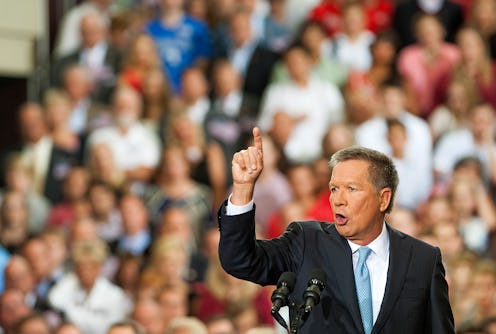News
Here's How John Kasich Feels About Israel
After Ohio Gov. John Kasich entered the presidential race on Tuesday in a vague and policy-light speech, many potential voters are already wondering what Kasich thinks about Israel, the Iran deal, and a multitude of other issues. Kasich became the 16th major Republican candidate to declare his presidential campaign. His speech was pretty thin in terms of the candidate's plans for the future, instead focusing on his past achievements. But if you look at his past statements, it's likely Israel and Iran will play a large part in Kasich's upcoming campaign.
It's no secret the governor is a fan of Israel. In March, he made a stir when he went to Washington to watch Israeli Prime Minister Benjamin Netanyahu address Congress. During his speech, Netanyahu urged Congress not to sign any peace agreements with Iran in regard to nuclear weapons. When asked why he attended, Kasich was blunt, stating that he is a "strong, emotional supporter of Israel." He also echoed Netanyahu’s wishes, agreeing with the prime minister’s points and stating that rather than negotiating with Iranian leaders, the United States should "ratchet up the pressure."
During the same trip, Kasich attended a meeting of the American Israel Public Affairs Committee, which is staunchly pro-Israel. Kasich was vocal about his beliefs that America should put Israel first, as he scolded President Barack Obama for not meeting with Netanyahu and instead seeking negotiations with Iran. "You can't separate this U.S.-Israel relationship," Kasich told The Washington Post in March.
Unsurprisingly, Kasich was not enthused by the recent nuclear weapons deal the United States struck with Iran. "I think the administration has probably fallen in love with the fact that they want to get an agreement, and when people are hyperventilating and unable to get one, sometimes they go and they sign something that they shouldn't," Kasich told Fox News' Bret Baier. "It's very dangerous to fall in love with your own idea." According to Kasich, the Obama administration should have walked away from the deal, like Ronald Reagan did in in the 1980s while negotiating with the Soviet Union. "So, you have to have the strength to walk away," Kasich said.
In addition to being pro-Israel, Kasich also worries about the impact of the Iran deal will have on other Middle Eastern allies. "The problem ... with all of this is just listen to our Arab friends who say, 'Listen, if you give the Iranians all this cash by lifting the sanctions, they're going to fund Hamas,'" Kasich told Fox News. "They're going to fund Hezbollah, who is the enemy to the Arab nations that we have things in common with.”
Like many Republicans, Kasich felt the nuclear deal was not strict enough on Iran and had been badly negotiated. "An agreement should make us safer, not less safe, and I'm very concerned that this deal fails to do that," Kasich told the Northeast Ohio Media Group. "We should be particularly concerned about the security of Israel because it is our responsibility to be a partner for its safety."
Although Kasich has not been an active member of Congress for almost 15 years, he spent 18 years as in the House of Representatives, where he served on the House Armed Services Committee before he left. Although he has not explicitly referenced this, Kasich is likely to draw on that experience during the campaign in order to convince potential voters that he has suitable foreign policy experience.
Kasich’s views on Israel fall squarely in line with the majority of the GOP presidential candidates, who unilaterally reacted negatively to the Iran deal. Although the deal will (hopefully) be long settled well before election day, Israeli interests will undoubtedly find a way into the upcoming 2016 election — at least, if Kasich has anything to say about it, that is.
Images: Getty Images (2)
